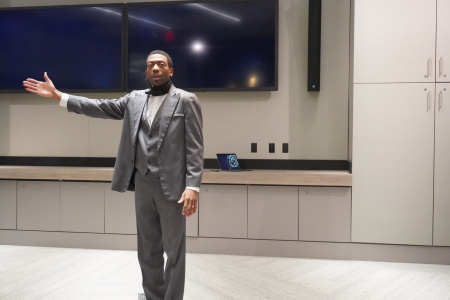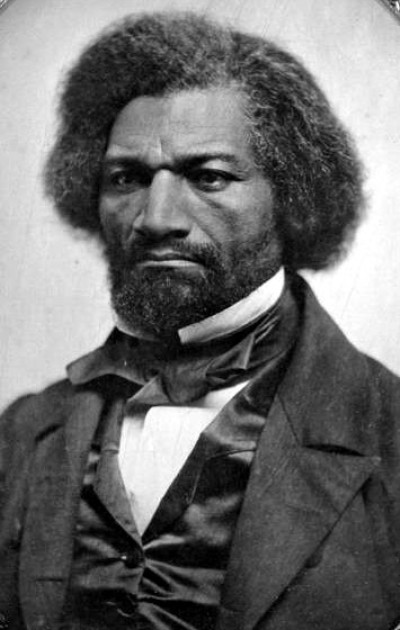'Determined to fulfill Christ's mission': Museum of the Bible event honors Frederick Douglass' legacy

WASHINGTON — Notable African American civil rights activist Frederick Douglass did not see people as “black or white,” but rather “made in the image of God,” according to a professional historical impersonator who has devoted his life to bringing the legacies of famed civil rights activists back to life.
Jeremiah Dew of South Carolina, known for his “One Voice: A Black History Narrative” performances, gave a presentation at the Museum of the Bible last Thursday as a part of the six-part Black History Month series titled “The Bible’s Impact on the Abolition Movement.”
In a presentation titled “Meet and Greet Frederick Douglass,” Dew impersonated Douglass, spoke about his legacy and how the famed abolitionist might view the current racial climate in America.

“Douglass’ life showed that he was doing his part to look beyond the surface. This is 1880. This is not 1980. So I think that deep down, Frederick Douglass didn’t see himself as a black person. He saw everyone as people, not black or white, but made in the image of God,” Dew said.
“Douglass would have seen equality as a must for all people. He lived in an era where separate but equal became the law the year he died.”
Dew, who earned a college degree in mass communication in 2007 and started his organization One Voice Show that same year, has entertained over 3 million people with his impersonation of black historical figures. He said that he read Douglass’ first autobiography over a decade ago, which changed his perspective on slavery forever.
Reading Douglass’ first of three autobiographies, Dew said, “opened his eyes” to the details surrounding the “traumas that blacks faced” through slavery. It motivated him to pursue performance and theater to bring black historical figures like Douglass back to life in a theatrical way.
“I was always pretty good at falling asleep on the textbook in junior high, so reading the autobiography helped me. And now years later as I impersonate figures like Frederick Douglass, it’s impactful for listeners to help them understand in new ways the emotions behind the printed work of Frederick Douglass’ first autobiography,” Dew told The Christian Post following his performance.
Dew hopes that the audience would understand more about how Douglass handled racism, division and discrimination through his viewpoint that all people should be equal.
“It wasn’t that Douglass was trying to lower people down to a certain level. Douglass saw everyone as created by God, and he believed that everyone should have equal opportunity to the American ideal life. And that wasn’t happening, so he had to speak about it,” he said.
“Douglass was the first black man to show up to the women’s suffrage events. He was a feminist. He wrote on women’s suffrage. He was born enslaved, and he moved beyond. It wasn’t just a black thing for him.”
Dew said that he believed that if Douglass were alive today, he wouldn’t agree with the current state of the global Church when it comes to the social division that often occurs among Christians on Sunday mornings.
“Douglass was mixed race. His second wife was white. He would have fit in well in this day and age. But, back then, he didn’t fit in,” said Dew.
Dew said that Douglass would have probably approved of multiethnic church environments based on his marital status to a white woman.
“Based on the way Douglass lived in his second marriage, I think Douglass would have been comfortable with diverse churches. His family was of mixed-race and his associations were of mixed-race within his Christian ministry,” Dew said.
Himself married to a white woman and the father of three mixed-race children, Dew said that skin color is not something he strives to focus on in his household.
“In my home, the kids are kind of like me and kind of like her. Something more needs to happen, other than just looking at each other based on color. The culture of our home has nothing to do with color,” Dew said of his family.
Dew said that Douglass not only agreed with diversity in the church setting, but Douglass also believed in the teachings of Jesus.
“Douglass was a big fan of Jesus. But, Douglass was not a fan of the people who claimed Christianity at that time in America,” Dew said.
“Jesus in the New Testament had a passion for compassion through saving people who were sick and lost. Douglass wanted to save the sheep that was lost. He wanted to get his family out of slavery. … Like, ‘let [my] people go.’”
“Douglass was determined to fulfill the mission of Christ,” he added. “Jesus did many things, and He not only tried to save people from a spiritual demise; but also from a practical sense in the community, in the same way that Douglas wanted to help others.”
Dew believes Douglass would have possibly agreed with Martin Luther King Jr.’s statement calling for church integration, calling the 11 a.m. hour on Sunday mornings one of the most segregated hours in Christian America.
He said Douglass would also have noticed that issues with racial barriers within the Church are “deep down spiritual matters,” which call for all Christians to have more connection to God and more community with brothers and sisters in Christ of all races.
“Douglass would not say much different than MLK, because if Douglass were here today, he would have seen people calling themselves Christians and not behaving in the spirit of the Scripture,” Dew said.
Aside from Douglass’ legacy leaving something for Christians to ponder, Dew said that Douglass’ life could teach Americans how to approach history and historical figures.
“People often think that all these historic figures are lumped into big groups. People will often say: ‘everyone white back then was racist or everyone who was black was against XYZ, and it’s not a healthy way to look at things,’” Dew explained.
“We need to realize that people aren’t all coming from the same places [and] not everyone agreed on the same things back then and now. ... I believe my impersonation performance [today] was helpful to viewers because it wasn’t a debate. But it gave the audience a chance to just watch and listen and learn that way.”
Event host Yolanda Henry told CP that the Museum of the Bible plans on holding more impersonation performances for Juneteenth (June 19), which became a federal holiday last year.
“In order to have people be engaged, they have to understand the culture and how the Bible impacted these black historical figures,” Henry said.
“I think we are excited with how today’s impersonation event went. Each week our audiences have grown. We had a great number today. And we are very pleased with the outcome. And we hope to continue to build and expand in the years to come.”
Throughout February, the museum held discussions honoring the contributions of the Slave Bible, Harriet Tubman, King, Harper’s Weekly and others.





















